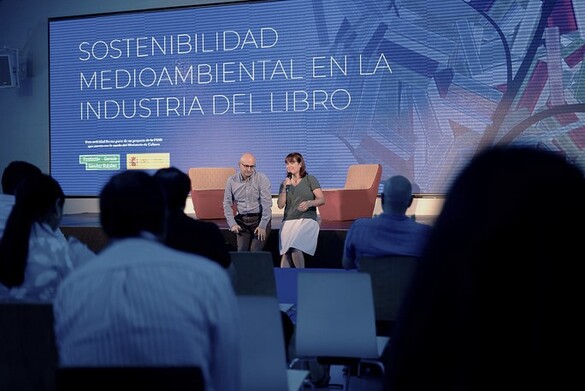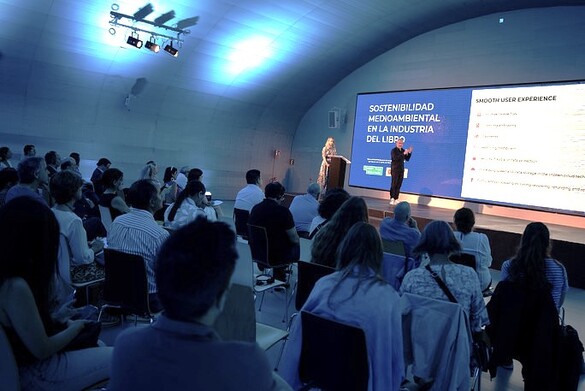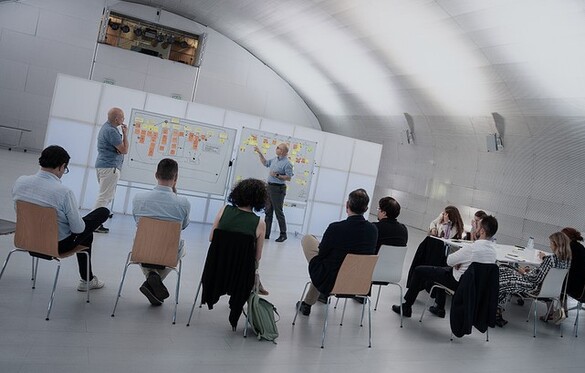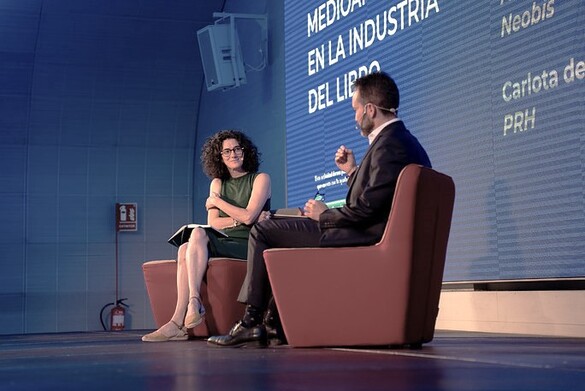On 17 July, the Germán Sánchez Ruipérez Foundation held a seminar on environmental sustainability in the publishing industry. Aldus Up partner FEP took part in the event, bringing the European perspective on the topic. The full day of reflections and discussions was divided in a morning of presentations by professionals from the book value chain and an afternoon of workshops in which all the speakers participated in a brainstorming on how to make the publishing sector “greener”.
The event opened with the welcoming words of Luis González, Managing Director of the FGSR, and some introductory remarks by María José Gálvez, General Director for Books and Reading Promotion in the Spanish Government. Mrs Gálvez mentioned that the book sector had seen an acceleration of its modernization due to the pandemic, and that it was now time for improving its sustainability, arguing that to begin with there was room for some rationalisation.

The first presentation was from Carlota del Amo, Communications Director at Penguin Random House, who spoke about “Putting your green glasses on”. Mrs del Amo stressed the importance of addressing sustainability along the whole value chain, focusing on production. She pointed at possible drivers at every stage of the supply chain, highlighting aspects related to paper production and usage, printing, and distribution, and putting emphasis on variables related to energy consumption and transport. She argued that data could help reduce the problem of return and mentioned the upcoming obligations under the EU Deforestation Regulation, lamenting that few stakeholders were aware of it in Spain. Looking at ways to reduce the business carbon footprint, Mrs del Amo suggested starting with digital, recalling how even emails could be polluting. After calling for a tool to measure the carbon footprint of books, she concluded by stating that we should not publish fewer titles – diversity is needed – but that we should do it better, working on the quantities printed [details of this presentation in Aldus K-Hub].
Next, Jörg Engelstädter, Founder, Thought Leader and Manager of The Future Book Forum at Canon EMEA, and Rachel Martin, Global Director of Sustainability at Elsevier, provided an update on the status of the Publishing 2030 Accelerator, the initiative launched in 2022 as a one-year project by a group of publishing industry operators to drive systemic change in the publishing sector. The Accelerator prioritised three initial workstreams: calculating the carbon footprint of an individual book, distributed printing, and reimagining the accounting of revenues to integrate sustainability considerations. In 2023, the Accelerator finalised these workstreams, producing a series of outputs in the form of proof of concepts, whitepapers and insights; these include a tool to calculate the carbon footprint of a book that will be launched at the next Frankfurt Book Fair. The speakers concluded with a set of recommendations, including understanding that climate action is good for business, bringing sustainability into all stages of decision-making, prioritising areas where one can have an influence, embedding sustainability into account reporting and starting innovating [details of this panel in Aldus K-Hub].

The following session saw Alice Wood, Sustainability Manager at the UK Publishers Association, present the work done by the PA in the field of sustainability, which is based on the UN Sustainable Development Goals. The PA, a signatory of the SDG Publishers Compact, created its Sustainability Task Force in early 2020 and developed a strategy which so far has resulted in launching an industry climate action pledge (Publishing Declares) and developing a carbon calculator and a materials matrix, to estimate the carbon footprint of businesses and understand the wider sustainability implications of materials used in publishing. Mrs Wood explained how the PA spread its environmental message and outlined the association’s future plans in this field [details of this presentation in Aldus K-Hub].
Next was Elena Pita, Director of the Biodiversity Foundation, a Spanish public sector organisation tasked with protecting and restoring biodiversity, nationally and internationally. Mrs Pita spoke of the importance of sustainability in the book sector, proposing to address the environmental challenges through a new development model that placed the biosphere as the basic framework in which all social and economic activities and phenomena were grounded. She mentioned the relevant legal framework at EU level, touching upon several pieces of legislation – including the EUDR. She then moved on to the Eco-publishing manual, a public sector guide with criteria and tools to manage publishing sustainably by calculating, minimising and communicating the environmental impact of publications. Mrs Pita pointed at the weight of elements such as raw materials and logistics, stating that a fully ecological book did not exist and recalling that digital also had a significant carbon footprint. Finally, she outlined the strategy and some initiatives of the Foundation.

It was then the turn of FEP. The presentation started with an overview of recent EU legislation in the field of sustainability that is sure or likely to affect book publishers, at some stage or in some measure – the EUDR first and foremost, but also the Corporate Sustainability Due Diligence Directive, the Ecodesign for Sustainable Products Regulation and the Packaging and Packaging Waste Regulation. Then FEP presented a series of initiatives and good practices in the book publishing industry as revealed by the survey conducted by FEP among publishers and PAs in 2023, looking at the levels of awareness and engagement across the sector. Finally, FEP made some broader reflections and provided some food for thought, touching upon possible levers for making publishing greener and other challenges for the sector [details of this panel in Aldus K-Hub: talk by Anne Bergman-Tahon and talk by Enrico Turrin].
The following session had Enrique Pascual, President of the Booksellers Association of Madrid, talk about sustainability form a bookseller’s perspective, on the basis of the work done in the framework of the RISE Bookselling project (an EU-funded project coordinated by EIBF), which carried out a study on the sustainability of the bookselling sector. Mr Pascual analysed all the areas in which a bookseller can work on sustainability, from energy consumption (heating, air-conditioning, lighting, etc.) to waste management and the circular economy (packaging, wrappings, bags, promotional materials, etc.), from orders and delivery (transportation, length of supply chains, frequency of deliveries, etc.) to digital (email lists, etc.), from management to raising awareness among customers (including by making them pay an adequate price for deliveries). The issue of returns emerged as a major one, unsurprisingly [details of this presentation in Aldus K-Hub].
The final session was a dialogue on how to be clever with processes, with Carlota del Amo and Álvaro García Barbero, President of Neobis, an association of the graphic design sector in Spain. The main message from the conversation was that sustainability requires communication and collaboration across the whole value chain.

 By
By 

















